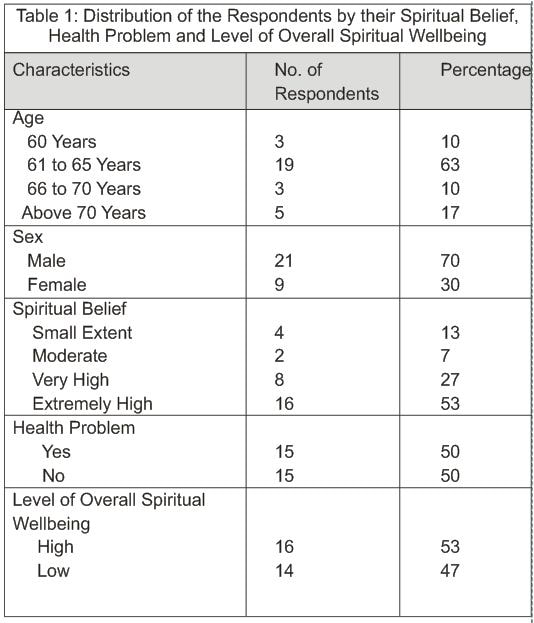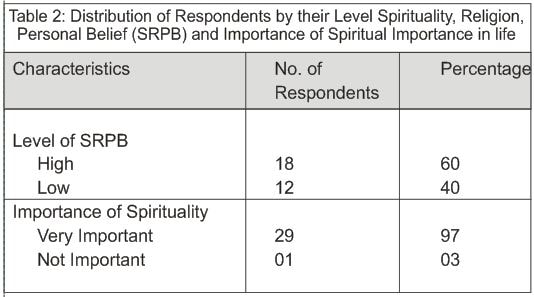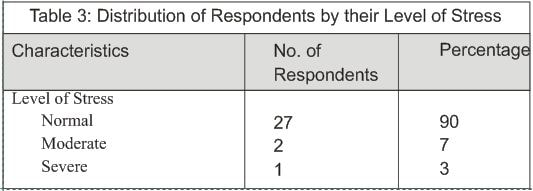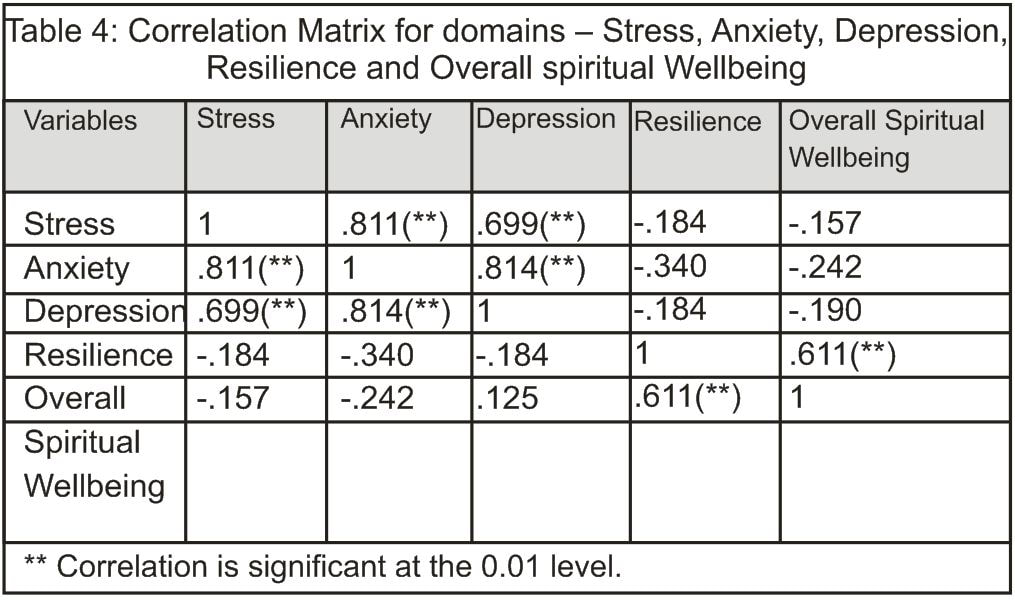|
ABSTRACT Health, today, cannot be conceived without including the dimension of spirituality in it. Today suicides, stress, anxiety, alienation, purposelessness and extreme levels of aspirations have become the style of life. The relationship between spirituality and various dimensions of health and quality of life among elderly has been extensively examined during the past decade. Empirical evidence is available in India and other countries to show a direct relation between spirituality, stress and quality of life. Comprehensive research evidence shows that spiritual beliefs and practices help many physical and mental illness, reducing both symptom severity and relapse rate, speeding up and enhancing recovery, as well as rendering distress and disability easier to endure. Spiritual care is a way of helping older people in their search for hope and meaning, especially as they face issues of grief, loss and uncertainty. The purpose of this quantitative, descriptive study was to explore the influence of spirituality in reducing the level of stress and improving the quality of wellbeing among the elderly practising spirituality. Keywords: Elderly, Stress, Wellbeing, Spirituality Introduction Spirituality plays an important role in Indian society across all ages. As one gets older, the role of spirituality becomes more prominent. Recent empirical studies have linked spirituality and health (Arcury, Quandt, McDonald, & Bell, 2000; Contrada et al., 2004). There is an increasing trend today to give considerable attention to spiritual aspects of health during medical treatment. With an increased number of elderly people in India, health professionals, including geriatric social workers, physicians and nurses must be able to recognize their spiritual concerns and intervene appropriately. However, a lack of information and knowledge about spirituality affects a professional’s comfort level in attending these spiritual aspects while providing health services. As a result, the elderly spiritual needs are either neglected or redirected to religious leaders. Spirituality has been conceptualized as including an individual’s transcendent relationship with a higher being or with the universe and has been positively linked to hope, coping, and religiosity (O’Neill and Kenny 1998). It has been found to be particularly important among older adults, and positively linked to self-appraised good health among elders (Daaleman and Frey 2004). There are a number of cross-sectional studies that indicate many people turn to spirituality as a resource for dealing with their pain (Ashby and Lenhart, 1994; Keefe and Dolan, 1986; Keefe et al., 1997; Rosenstiel and Keefe, 1983). Although limited, there are some longitudinal studies that suggest religion and spirituality may be positively correlated with lower pain scores (Turner and Clancy, 1986) and improved mood (Keefe et al., 2001). While it is established that spirituality is often used as a coping strategy, it is still not fully understood if spirituality is related to mental health, physical health, or quality of life in those with chronic pain as findings on outcomes have thus far been mixed and inconsistent. The purpose of this study is to examine the relationship between spirituality and stress among the elderly practising spirituality. In this study, it is hypothesized that spirituality will contribute significantly to predicting better mental health. Life Stress And Affective Well-being In order to fully establish a rationale for the present investigation, literature documenting a firm inverse association between spirituality (e.g. internal religious orientations) and negative affective symptoms (e.g., Pargament, Cole, Vandecreek, Belavich, Brant, & Perez, 1999; Duncan, 2000) must be reviewed. As reported in numerous studies, adopting any one of several personal spiritual orientations often buffers against negative affective outcomes (Simoni & Ortiz, 2003; Fabricatore, Handal, & Fenzel, 2000). For example, Bush and colleagues (1999) found positive religious coping styles to be associated with improved positive affect. Previous literature has also pointed to a link between life stress, spirituality, and affective wellbeing (e.g. Tarakeshwar, & Pargament, 2001, Peltzer, Cherian, & Cherian, 1999). Fehring, Brennan, and Keller (1987) demonstrated the positive impact of spiritual well-being, existential well-being, and spiritual outlook on negative moods in response to life stress. Spirituality can help us develop healthy behaviors and lifestyles; find psychosocial support; and effectively deal with suffering, life’s problems, and negative emotions such as stress, anxiety, fears, anger, and frustration (Hadzic, 2011). Spirituality And Wellbeing The relationship between spirituality and well-being has been well-documented in the United States. Numerous empirical findings indicating salutary effects of spirituality/religion on physical and mental health have been found in the literature in Western society. In general, spirituality and religion contribute to lowering the risk of certain diseases (e.g., heart disease, emphysema, stroke, and kidney failure, etc.) and overall mortality. Spirituality and religion have positive associations with well-being, general psychological function, and marital satisfaction, and negative associations with suicide, delinquency, criminal behaviors, and drug/alcohol use. Especially, sense of hope and peace, love and joy, meaning and purpose in life, self-transcendence, forgiveness of self and others, awareness and acceptance of hardship and mortality, and a heightened sense of physical and emotional well-being have been indicated as consequences of spirituality in nursing literature (Coyle, 2002; Haase et al., 1992; Reed, 1986; Tanyi, 2002). Shigaraki (1983) also maintained that whether or not people attain enlightenment, religion is considered to provide a peace of mind by integrating and harmonizing various contradictions, confrontations, and confusions in a daily life by providing existential meaning and reality and the principle of life. People will have comfort and hope through the existential meaning and gain emotional support through the principle of life. Spirituality, Well-being And Healthy Aging As regarded association between health aging and religious well-being, Campbell (1981) suggested that well-being depends on the satisfaction of three basic kinds of need: The need for having, the need for being. A fourth set of need which was acknowledged later was termed as the need of transcendence. This refers to the sense of wellbeing that we experience when we find a purpose to commit ourselves, which involve ultimate meaning for life. Sehgal (2005) explored perspectives on health, disease, characteristics of healthy person, role yoga and meditations on health, and methods to promote health. Spirituality And Mental Health Spirituality appears to be preventative of mental disorders (Cohen & Koeing, 2004). Many studies showed that spirituality has a positive correlation with life satisfaction, happiness, and higher morale. Additionally, a positive relationship with optimism and hope has been evidenced in 12 out of 14 studies with a sense of meaning and purpose in life (15 out of 16 studies), with social support (19 out of 20 studies), and with having higher marital satisfaction (35 out of 38 studies; Almeida et al., 2006). In one study, quality of life was positively correlated with some indices of spirituality and was negatively correlated with helplessness and hopelessness (Cotton et al., 1999). Some feelings triggered by beliefs such as a sense of peace, comfort, connectedness, and existential beliefs towards death and eternity have been reported to be negatively associated with feelings of hopelessness and stress (Ironson et al., 2002). Methodology The purpose of the study was to assess level of stress and wellbeing among the elderly practising spirituality and to find out association between socio-demographic variables and spirituality among elders. Descriptive research design was used. A total of 30 (15 male and 15 female) elderly practising spiritual meditation at Brahamkumaris World Spiritual University, Tiruchirappalli city, Tamilnadu, India were selected through simple random sampling procedure. The inclusion criteria for this study are (a) elders within the age group of 60- 75 years, (b) elders who have engaged in regular spiritual meditation practice and (c) elders with regular spiritual class attendance. The objectives of the study are: 1. To find out the socio-demographic characteristics of the elderly practising spirituality. 2. To assess the level of stress among the respondents. 3. To identify the level of spiritual wellbeing among the elderly practising spirituality. Instruments Interview schedule was used to collect the data. The demographic questionnaire included information regarding the respondent’s age, gender, race, education, family size, marital status, monthly income, occupation, property, present health complaints and duration of spiritual mediation practice. Level of stress was assessed by using DASS (Depression, Anxiety and Stress Scale). The DASS is designed to provide relatively pure measures of the three related negative affective states of depression, anxiety, and stress developed by P. F. Lovibond & S. H. Lovibond (1995) and Spiritual wellbeing scale (SWB) developed by Paloutzian and Ellison (1982) was used to measure spiritual wellbeing. The SWB scale was developed by Paloutzian and Ellison in 1982 to measure the subjective spiritual quality of life. It assesses two aspects of an individual’s spiritual life; Religious Well Being (RWB), the individual’s feelings of personal well-being with God, and Existential Well Being (EWB), a more horizontal measure of well being between self and others. The researcher identified potential subjects and invited eligible elders to participate in the study. The researchers explained the study to all subjects and informed consent was obtained prior to completion of the questionnaires. The interview schedule was also pretested. The data collected were analysed and findings were depicted in the form of percentages and proportions. Results The general socio-demographic characteristics of the respondents are summarized in Table 1. Spirituality plays an important role in Indian society across all ages. As one gets older, the role of spirituality becomes more prominent. The table depicts that (63%) of the elderly practising spirituality were in the age group of (61 to 65 years). With respect to the sex (70%) of the elderly were male and (30%) of them were female. Spiritual belief among the elderly plays a major role in improving their health status and helps them to recover from illness. The above table indicates that more than half (53%) of the elderly have extremely high level of spiritual belief and more than one forth (27%) of the elderly had a very high level of spiritual belief. So the elderly with good spiritual outcome experience low level of stress compared to elders with low level of spiritual belief. Spiritual resources give a feeling of strength and they are a guide to find significance in life. Spiritual inner resources give a feeling of strength in time of crisis, when dealing with uncertainties of life (Wills, 2007). It also inferred that half (50%) of the respondents have health problem. Spiritual wellbeing lies at the very core of one’s life-span journey with respect to ultimate concerns about the meaning of life and a need for wholeness, transcendence, or enlightenment. Achieving Spiritual wellbeing implies a sense of harmony, inner freedom, and peace in relationship to a transcendent entity such as God, community, nature, the environment, or the cosmos. With respect to the level of overall spiritual wellbeing among the elderly, more than half (53%) of the respondents have very high level of overall spiritual wellbeing. Many researchers have demonstrated that spiritual belief affects the well-being of elderly as it plays a significant role in their lives, thoughts, and behaviours. Generally positive relationship appears to exist between spiritual belief and wellness. This study indicates that significant (60%) of the elderly have high level of religion, personal belief (SRPB). Spirituality plays an important on elder’s wellbeing. Many studies indicate that spirituality positively relate to acceptance of death (Shin, 2002), quality of life (Jeon, 2003) and spiritual well-being. Elders’ participation in spiritual practices has a significant positive correlation with acceptance of death. This study also reveals that vast majority (97%) of the elderly report that spirituality is very important for them in life. Significant number of research studies suggests that spirituality is associated with psychological adjustment and function as a stress-resistance resource. While assessing the level of stress among the elders practising spirituality, it was found that majority (90%) of elders practising spirituality were normal and very small proportion of the respondents had moderate and severe level of stress respectively. Hence it is clear that Spiritual well-being is an important parameter of mental health and successful ageing. Spirituality can provide a sense of purpose, meaning, and self-integration after health crises and other major life events. It can be a coping resource for the elderly person with stress and illness (Coward & Reed, 1996; Gurklis & Menke, 1988; Reed, 1991). The above table depicts that stress has positive correlation with anxiety at 0.01 levels. When level of stress increases, the level of anxiety also increases. Stress also has positive correlation with depression at 0.01 levels. It means that higher the level of stress, higher will be the level of depression. But, stress has negative correlation with resilience and overall spiritual wellbeing among elders. Depression among elderly has a significant relation with anxiety at 0.01 levels and no significant relation with resilience and overall spiritual wellbeing. The resilience has a positive correlate with overall spiritual wellbeing and negative correlation with stress, anxiety and depression. This shows that higher the spiritual wellbeing, higher will be the level of resilience among elderly. Moreover, overall spiritual wellbeing has negative correlation with stress, anxiety and depression.
Discussion This present paper attempts to advance the empirical study of linking spirituality and wellbeing. Spirituality has been reported to have positive impacts on physical and mental well-being. In the present study, the associations between spirituality and wellbeing are examined with a sample of older adults practising spirituality at Brahmakumaris World Spiritual University, Tirchirappalli. Overall, the findings demonstrate that spirituality has a positive effect on health as do other demographic factors such as age, sex, spiritual beliefs etc. Significant percent (63%) of the elderly were in the age group of (61-65 years). More than half (53%) of the elderly show extremely high level of spiritual beliefs. Overall spiritual wellbeing was observed with more than half (53%) of the elders who practice spirituality. Our results show that the majority of the elders considered themselves to have a high level of spiritual wellbeing and their level of life stress was also found to be normal. Spiritual practice is associated with mental and physical health. Numerous studies have found a positive relationship between spiritual practice, such as spiritual meditation, reading spiritual magazine, discussion spiritual matters with others and positive mental and physical health among seniors. Spiritually involved older adults are generally less prone to Stress, suicide, depression, anxiety,smoking and alcoholism, and are more satisfied with their lives, with a greater sense of wellbeing. Studies have found that older adults who practice spirituality regularly have lower blood pressure, fewer heart attacks, stronger immune systems to fight diseases such as cancer, and are less likely to die of coronary artery disease. Moreover, this study states that more than half of the elderly have extremely high level of spiritual belief and majority of the elders practising spirituality are less prone to stress. It may be due to the fact that higher the level of spirituality and lesser will be the level of stress among elderly. Conclusion Social work professionals have their own roles in each stage of geriatric care management. Empirical support has been demonstrated for a positive relationship between spirituality stress and wellbeing. Spirituality is associated with deep values, a central philosophy of life, and inner resources of the elderly person. It also implies a sense of harmony, inner freedom, and peace in relationships to God/Heaven, nature, and the environment. That is why the elder person with good spiritual outcome views that suffering is part and parcel of the human experience and part of nature itself as well. Accordingly, it is not difficult to observe that the elderly person seldom complain pain even though they have intensive pain. This investigator suggest that spirituality grows though continual, mutual process when individuals make choices to actualize potentials which reflect a sense of meaning in life, interconnectedness with all living things, and awareness of a transcendent dimension or being. The research showed that spirituality plays an important role in the health of older people. Elderly persons with a high spiritual wellbeing were able to manage their health better. References
Dr.P. Ilango Professor & Head, Department of Social work, Bharathidasan University, Tirchirappalli. P.Udhayakumar Ph.D Research Scholar, Department of Social Work, Bharathidasan University, Tirchirappalli. |
Categories
All
Social Work Learning Academy50,000 HR PROFESSIONALS ARE CONNECTED THROUGH OUR NIRATHANKA HR GROUPS.
YOU CAN ALSO JOIN AND PARTICIPATE IN OUR GROUP DISCUSSIONS. MHR LEARNING ACADEMYGet it on Google Play store
|
SITE MAP
SiteTRAININGJOB |
HR SERVICESOTHER SERVICESnIRATHANKA CITIZENS CONNECT |
NIRATHANKAPOSHOUR OTHER WEBSITESSubscribe |
MHR LEARNING ACADEMY
50,000 HR AND SOCIAL WORK PROFESSIONALS ARE CONNECTED THROUGH OUR NIRATHANKA HR GROUPS.
YOU CAN ALSO JOIN AND PARTICIPATE IN OUR GROUP DISCUSSIONS.
YOU CAN ALSO JOIN AND PARTICIPATE IN OUR GROUP DISCUSSIONS.
|
|










 RSS Feed
RSS Feed





